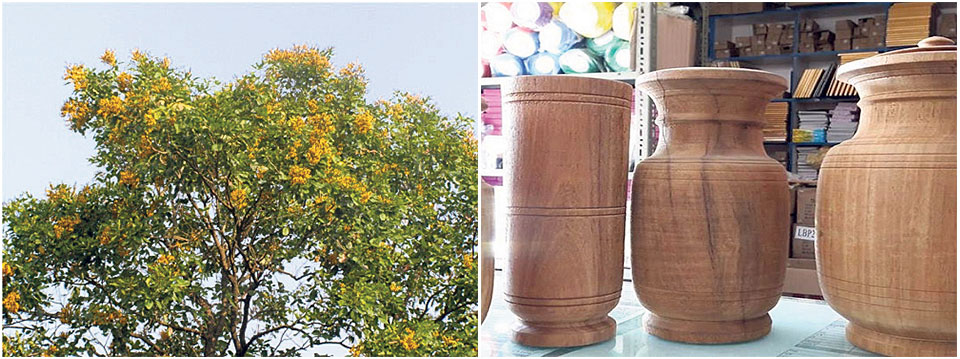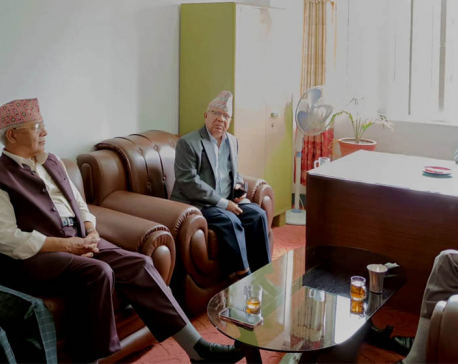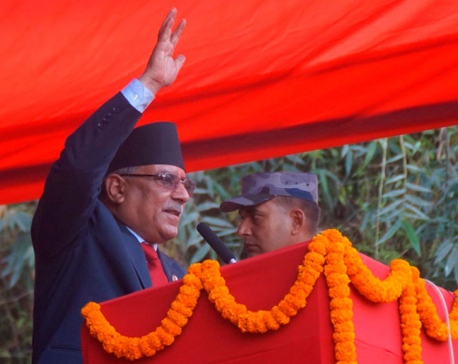
OR

Though classified as vulnerable by IUCN, efforts to conserve the tree have been scarce
MAHENDRANAGAR, Oct 23: When Pushpa Kamal Dahal, chairman of CPN and former prime minister, was offered a vase made of Vijayasar as token of love during a function in Kanchanpur last year, nobody had imagined that the popularity of the vase would soon surge. Federation of the Chamber of Commerce and Industries (FNCCI) had gifted him the vase while speaking at the Far Western Industrial Trade Fair and Kanchanpur Tourism Festival. Chief guest of the function, President of FNCCI, Kush Kumar Joshi also took home the same gift.
There is a long list of VIPs and VVIPs that have preferred to have the vase as a token of love. Even though it has been a decade since the vase has been in the market, it has become popular since the last two years. Former ministers and prime ministers gave it a new high as they took away vase made of it as a gift. The popularity has been so much so that even commoners these days don’t bade goodbye to their guests without handing over this ‘special brand of Kanchanpur’.
“The vase has been not so much popular ever. Everyone prefers to offer or receive it as a gift. It is being considered the best gift to give to your loved or revered one,” said Ganesh Dutta Bohora whose fortune actually shined because the vase. “It is a matter of pleasure for us because now the vase has become synonymous to Kanchanpur’s brand,” he added.
Bohora owns a timber shop. Before he started selling the vijayasar vases, he was just an ordinary businessperson. As vases gained popularity, he also got more and more busy. He highlighted and sold the item not just in Kathmandu and other towns in the country, but he even made trips to China and India for selling the wooden vase.
“It is a far-fetched dream for a small businessman like me to fly to China or India for business. However, this vase gave me that opportunity,” he shares.
He had participated in Sigotse of China to participate in ‘Nepal - China financial and trade fair’ held three years ago. He had gone there as a member of the representative team of the ministry of Commerce and Supply.
“The visit contributed to the demand of the vase. Many people liked it,” he reported. The vase is made from a tree called Vijayasar, pterocarpus marsupium. Drinking water from the vase, is considered to have health benefits. The tree is found in Kanchanpur, Kailali and Kapilbastu districts. The plant is classified as vulnerable by the IUCN. However, in lack of conservation efforts, locals had been using it for making vases, timber, and firewood.
“This tree is not found everywhere. It is found only in three districts of Nepal. We did not know its value earlier, but now we are very cautious,” said Bohora.
“I was not aware of the benefits of the tree before my China trip. Before the trip, I reached out to various homeopathic doctors and learned about the medicinal value of the tree. They said that the water kept in the vase is beneficial for treating gastritis, sugar, urine infection, joints pain and many other ailments,” Bohora stated.
Water kept in the vase looks blue at the top, red at the middle and yellow at the base. When people see this, they feel amazed and love to take the vase home.
Bohora had registered Merit Kastha Udhyog in 2002 at Bhasi of Bhimdutta Municipality. He got support from Madanraj Bhatta of the same locality to run the factory. The factory saw highs and lows, however, now it is one of the most prestigious business in the region.
“We started this business with an initial investment of 15,000 rupees. Gradually, we invested more efforts and money,” Bohora narrated. “After we switched our focus on making vijayasar vases, our days changed,” he added.
While Bohora is thinking of further expanding his business, there are others too who want to join in. Locals are stressing on professional farming of the plant so that it provides opportunities to expand the business.
Until few years ago, a normal size vase used to cost Rs 80. Now, it costs no less than Rs 400. “We need to organize cultural and tourism festivals to further publicize the benefits of the vase,” Bohora says.
You May Like This

After discussions with five top leaders of the then CPN, Dahal says - ‘There is a possibility of unity’
KATHMANDU, JULY 20: Chairman of the ruling CPN (Maoist Center) Pushpa Kamal Dahal has said that the issue of party... Read More...

Contribution based social security scheme appreciative: Chairman Dahal
KAWASOTI, Nov 30: Chairman of the ruling communist party of Nepal (CPN) Pushpa Kamal Dahal has said the recently launched... Read More...

CPN (United) decides to integrate with CPN (Maoist Center)
KATHMANDU, Oct 9: The CPN (United) is to unite with the CPN (Maoist Centre). A politburo meeting of the party... Read More...






Just In
- Challenges Confronting the New Coalition
- NRB introduces cautiously flexible measures to address ongoing slowdown in various economic sectors
- Forced Covid-19 cremations: is it too late for redemption?
- NRB to provide collateral-free loans to foreign employment seekers
- NEB to publish Grade 12 results next week
- Body handover begins; Relatives remain dissatisfied with insurance, compensation amount
- NC defers its plan to join Koshi govt
- NRB to review microfinance loan interest rate











Leave A Comment